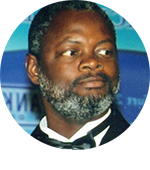
ANTIGUA’S Minister of Foreign Affairs said that CARICOM was ‘blindsided’ by the open European intervention on Baroness Scotland.
Was it a day when the mouse roared or was it artful diplomatic ventriloquism where the three lions of the UK were raising their voices. It would appear that this was a conspiracy in which Dominica may have been fully aware. The question then arises as to whether we have a Caribbean citizen as Commonwealth Secretary General or a European clothed with Caribbean garments.
Minister Fernandez in his analysis of what went wrong for Sir Ronald Sanders, said: ‘’We went up against Africa on one hand, and the other (voting) bloc of the Europeans. As you know Baroness Scotland is a member of the English Parliament. They openly lobbied very heavily for her. Also the Australians lobbied openly with the Pacific Countries. So, in effect, we were marginalized to say the least – and had a very, very tough time going forward’’.
The breakdown of the 53 member countries of the Commonwealth is as follows:
Pacific: 11 votes
Caribbean: 13 votes
Europe – 3 votes
Asia – 8 votes
Africa – 18 votes
Once the UK was able to get Australia to rally the Pacific and Asia votes, together with Dominica and their Little England – Barbados, they would have secured the election with 24 votes. Africa would have rallied around their candidate with their 18 votes and CARICOM would have been ‘blindsided’ with their remaining 11 votes.
Sir Ronald Sanders never had a chance to win from the very first round. The UK wanted someone who would have been sympathetic to their causes at the Commonwealth Secretariat. They found a willing candidate and the rest is history.
Baroness Scotland now has a huge task to win the confidence of the Caribbean Governments and to show her independence and more so her commitment to the development of the Caribbean. It is unfortunate that CARICOM had to face this level of embarrassment, and were not diplomatic – savvy to see this was always the intent of the UK.
When the OECS Heads could not have convinced Dominica to withdraw its candidate despite intense pressure, it should have been clear what the final plot was. CARICOM should have done the numbers and realized that they had a ‘dead horse’ in the race. The approach should have been to work with the African countries with their 18 votes and to come to some arrangement, you support me now and I will support you next. The mathematical skills of Dr. Keith Mitchell seem to have been unused by CARICOM as 18 + 11 = 29.
This messy situation, however, shows the weakness of our Community and the ease at which external influence can affect the operation and future of CARICOM and indeed also the OECS. Where does CARICOM go from here? There is some healing to be done among the leaders as this was a firsthand experience of the Heads of Governments. We have greater issues which as a region we must face. I was quite impressed with the statement made by our Prime Minister at the COP21 meeting in Paris. I however, thought he should have been a bit more direct in stating a position on how the larger countries must respond to the effects of Climate Change on small island states.
I firmly believe that our collective diplomatic capital in the region should be directed in pressing a case for low interest loans as a consequence of the effect of climate change on our economies. We must make a case for “ degraduation’ and to say that we cannot be excluded from these soft loans when we have been incurring huge cost to replace our infrastructure. This case must be made to the World Bank and COP 21 should have been the platform for all leaders of the Caribbean to make that case.
Let us all hope that CARICOM will survive the external onslaught and together as a region we can forge a better future for our children.













